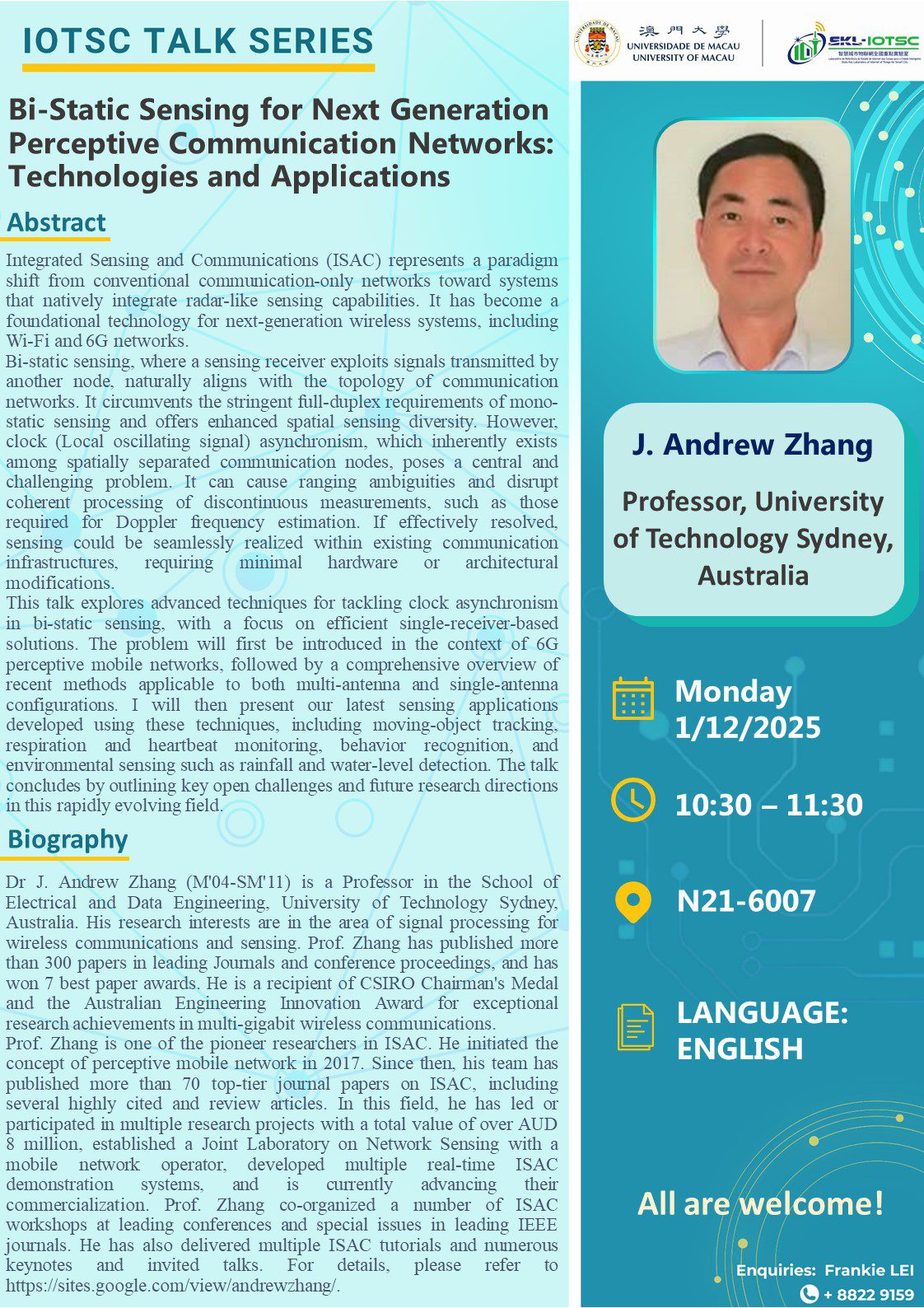IOTSC TALK SERIES: Bi-Static Sensing for Next Generation Perceptive Communication Networks: Technologies and Applications

Dear Colleagues and Students,
The State Key Laboratory of Internet of Things for Smart City would like to invite you to join our “IOTSC Talk Series” on 1/12/2025 (Monday). We are pleased to invite Prof. J. Andrew Zhang from University of Technology Sydney, Australia as the speaker.
Bi-Static Sensing for Next Generation Perceptive Communication Networks: Technologies and Applications
Speaker: Prof. J. Andrew Zhang
Date: 1/12/2025 (Monday)
Time: 10:30 – 11:30
Language: English
Venue: N21-6007
Abstract:
Integrated Sensing and Communications (ISAC) represents a paradigm shift from conventional communication-only networks toward systems that natively integrate radar-like sensing capabilities. It has become a foundational technology for next-generation wireless systems, including Wi-Fi and 6G networks.
Bi-static sensing, where a sensing receiver exploits signals transmitted by another node, naturally aligns with the topology of communication networks. It circumvents the stringent full-duplex requirements of mono-static sensing and offers enhanced spatial sensing diversity. However, clock (Local oscillating signal) asynchronism, which inherently exists among spatially separated communication nodes, poses a central and challenging problem. It can cause ranging ambiguities and disrupt coherent processing of discontinuous measurements, such as those required for Doppler frequency estimation. If effectively resolved, sensing could be seamlessly realized within existing communication infrastructures, requiring minimal hardware or architectural modifications.
This talk explores advanced techniques for tackling clock asynchronism in bi-static sensing, with a focus on efficient single-receiver-based solutions. The problem will first be introduced in the context of 6G perceptive mobile networks, followed by a comprehensive overview of recent methods applicable to both multi-antenna and single-antenna configurations. I will then present our latest sensing applications developed using these techniques, including moving-object tracking, respiration and heartbeat monitoring, behavior recognition, and environmental sensing such as rainfall and water-level detection. The talk concludes by outlining key open challenges and future research directions in this rapidly evolving field.
Speaker’s Bio:
Dr J. Andrew Zhang (M’04-SM’11) is a Professor in the School of Electrical and Data Engineering, University of Technology Sydney, Australia. His research interests are in the area of signal processing for wireless communications and sensing. Prof. Zhang has published more than 300 papers in leading Journals and conference proceedings, and has won 7 best paper awards. He is a recipient of CSIRO Chairman’s Medal and the Australian Engineering Innovation Award for exceptional research achievements in multi-gigabit wireless communications.
Prof. Zhang is one of the pioneer researchers in ISAC. He initiated the concept of perceptive mobile network in 2017. Since then, his team has published more than 70 top-tier journal papers on ISAC, including several highly cited and review articles. In this field, he has led or participated in multiple research projects with a total value of over AUD 8 million, established a Joint Laboratory on Network Sensing with a mobile network operator, developed multiple real-time ISAC demonstration systems, and is currently advancing their commercialization. Prof. Zhang co-organized a number of ISAC workshops at leading conferences and special issues in leading IEEE journals. He has also delivered multiple ISAC tutorials and numerous keynotes and invited talks. For details, please refer to https://sites.google.com/view/andrewzhang/.
All are welcome!
For enquiries: Tel: 8822 9159
Email: frankielei@um.edu.mo
Best Regards,
State Key Laboratory of Internet of Things for Smart City